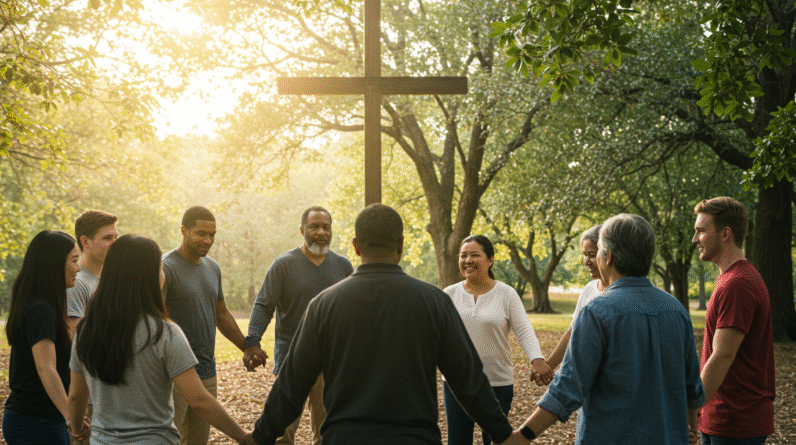How To Love Your Enemies: A Radical Christian Call
You’ve probably heard the phrase and felt the chill that follows: “Love your enemies.” It’s short, memorable, and somehow both comforting and terrifying. Jesus didn’t hedge this command. Loving those who hurt you or stand against you is at the heart of his radical agenda. In this article you’ll explore why this teaching is so hard, what Jesus actually meant, and—most importantly—how to love your enemies in ways that are faithful, safe, and transformative.
Why the command feels impossible
When you first read Jesus’ instruction, it registers as moral poetry that your heart wants to admire but your instincts want to reject. You’re built to protect yourself, to retaliate, to defend reputation and family. Loving enemies feels like a threat to survival. Your reactions—anger, avoidance, revenge—are understandable and often culturally reinforced. But Jesus wasn’t offering sentimental advice; he was calling you into a different economy of life, one that upends the tit-for-tat logic you know well.
This teaching feels impossible because it hits a deeper truth: loving enemies requires a changed heart. It asks you to act against instinct and to participate in a spiritual practice that reshapes your desires, not just your behavior. That’s why you’ll see Jesus combine commands like “love your enemies” with spiritual practices—prayer, forgiveness, mercy—that form you over time.
What Jesus actually said about loving enemies
The clearest articulation of this command comes in the Sermon on the Mount. Jesus says directly: “But I tell you, love your enemies and pray for those who persecute you” (Matthew 5:44). He doesn’t add caveats like “if they deserve it” or “if it’s convenient.” He situates loving enemies inside a larger teaching that calls you to be perfect as your heavenly Father is perfect (Matthew 5:43-48). In Luke, he expands on the “how” by showing that this love includes doing good to those who hurt you: “But to you who are listening I say: Love your enemies, do good to those who hate you” (Luke 6:27-36).
You’ll notice two things when you read these passages closely. First, Jesus links loving enemies to prayer—there’s a spiritual discipline involved. Second, he frames the command as witness: loving enemies shows you to be children of your Father who “causes his sun to rise on the evil and the good” (Matthew 5:45). In short, loving your enemies is a spiritual formation and a testimony.
The radical examples Jesus gave
Jesus didn’t merely teach; he embodied. On the cross, in the midst of agonizing injustice, he prayed, “Father, forgive them, for they do not know what they are doing” (Luke 23:34). That prayer is a dramatic demonstration of loving enemies under direct persecution. It shows that loving enemies is not passive naivety; it’s a costly choice that surfaces in the hardest moments.
Back in the Gospels, Jesus also taught non-retaliation—“turn the other cheek” (Matthew 5:39)—and called you to bless and pray for persecutors (Romans 12:14). These examples and instructions are radical because they break the cycle of revenge and force you to imagine a different way of responding to harm: with mercy, with prayer, and with creative, nonviolent resistance.
Why this command is more than moralism
If you try to love your enemies by sheer force of will, you’ll burn out fast. The gospel makes this different. The call to love enemies is grounded in God’s action: you’ve been forgiven, shown mercy, and invited into a life that mirrors God’s character (Ephesians 4:31-32; Colossians 3:12-14). Jesus doesn’t ask you to love like a Stoic saint; he invites you to be shaped by grace so that the love you offer flows from a renewed heart. That’s the difference between would-you-be-a-better-person advice and a transformational way of life.
Practical spiritual steps for how to love your enemies
You’re likely asking: “But how, practically, do I love my enemies?” Here are steps that integrate spiritual formation, biblical wisdom, and real-world wisdom. Each step shapes you while protecting your dignity and safety.
- Pray for them. Prayer changes you more than it changes the other person. Jesus links prayer directly to loving enemies: “Love your enemies and pray for those who persecute you” (Matthew 5:44). When you pray, you open a channel for God’s grace to move in your heart, displacing bitterness.
- Bless, don’t curse. The Bible gives you a counterintuitive tactic: bless your enemy. “If your enemy is hungry, feed him; if he is thirsty, give him something to drink” (Proverbs 25:21-22). Doing small acts of kindness breaks the expected script and creates moral pressure for reconciliation or at least reduces enmity.
- Refuse revenge and pursue justice wisely. Scripture says not to repay evil for evil and instructs you to leave vengeance to God: “Do not repay anyone evil for evil… Do not be overcome by evil, but overcome evil with good” (Romans 12:17-21). That doesn’t mean you ignore injustice. Loving enemies doesn’t preclude pursuing justice or protecting yourself; it changes your motive and methods.
- Practice empathy and remember God’s image. You’re told that every human is made in God’s image (Genesis 1:27). This doesn’t erase harm, but it helps you see the person behind the offense, which is crucial for genuine love. Empathy doesn’t excuse abusive behavior, but it prevents dehumanization—an important step in how to love your enemies.
- Forgiveness as a discipline separate from reconciliation. Forgiveness is often conflated with reconciliation, but they’re different. Forgiveness frees you from bitterness even if the other person never apologizes. The call to forgive is repeated throughout Scripture—“Forgive as the Lord forgave you” (Colossians 3:13; see also Matthew 6:14-15). Reconciliation requires safety and mutual repentance.
- Set wise boundaries. Loving enemies does not mean allowing ongoing abuse. You can love and still set boundaries that protect you and others. Boundaries are part of loving stewardship of your life and responsibilities.
- Be generous, not transactional. Jesus frames loving enemies as generous action—giving when it’s costly. “If someone slaps you on the right cheek, turn to them the other cheek also” and later “If anyone forces you to go one mile, go with them two miles” (Matthew 5:39; Matthew 5:41). These images push you toward generous, disarming behavior.
These steps are practical and spiritual. You don’t have to perfect them all at once; start with prayer, and allow the other practices to grow naturally as God shapes you.
Dealing with real dangers and abuse
Your first priority is safety. The command to love enemies does not force you into danger or silence victims of abuse. Scripture condemns harm and calls communities to justice. Loving your enemy does not require you to return to a harmful situation or refuse legal protection. You can love from a distance, pray for your abuser’s transformation, and pursue legal or therapeutic measures to keep yourself and others safe.
When you’re considering how to love your enemies in situations of abuse, prioritize safety plans, community support, and professional help. Loving the person who harmed you can mean praying for them, setting boundaries, or supporting their accountability process—not putting yourself back under the same harm.
Common misconceptions about loving enemies
You’ll hear a few common misunderstandings that can discourage faithful practice:
- Misconception: Loving enemies means liking them or excusing their actions. Reality: Love is not the same as endorsement. You can oppose wrongdoing while praying for the person who committed it.
- Misconception: Loving enemies is passive and lets injustice win. Reality: Biblical love seeks justice and restoration, often through sacrificial, nonviolent means (Romans 12:17-21).
- Misconception: Forgiving someone obligates reconciliation. Reality: Forgiveness is an inner act God calls you to; reconciliation requires repentance and mutual effort.
Understanding these distinctions helps you pursue how to love your enemies with both courage and wisdom.
Love, accountability, and the church
The church is called to be a community where love and accountability coexist. When an offense happens inside the body, you’re called to practice restorative steps outlined by Jesus in Matthew 18, but always with care for truth and protection. Churches should be places where victims find safety, perpetrators face responsibility, and repentance is pursued. Loving enemies in the church context means advocating for truth and restoration—not hiding abuse or excusing sin.
You’ll also find practical help in community: spiritual mentors, prayer partners, and counsel. Love for enemies should be taught and practiced in community settings so the burden doesn’t fall on one person alone. Churches that miss this balance often either become permissive or legalistic; faithful practice requires both grace and truth.

Historical and modern examples that illustrate the call
History gives striking examples of what loving enemies looks like in practice. Corrie ten Boom forgave the Nazis who imprisoned her family, choosing to speak of Christ’s forgiveness even to those who had caused profound harm. Martin Luther King Jr. drew explicitly on Jesus’ teachings to lead a nonviolent movement that resisted systemic evil while loving opponents and opening pathways for societal change. These examples show that loving enemies doesn’t mean passivity; it means a courageous refusal to allow evil to shape your responses.
Their lives show how powerful a witness can be when love and integrity combine. They weren’t naive; they faced consequences, but they also bore witness to a different power—transformative, sacrificial, and ultimately prophetic.
The spiritual benefits and transformation you’ll experience
When you begin to practice how to love your enemies, your inner life changes. Bitterness and the desire for revenge lose their grip. Your prayer life deepens because you’re honest with God about the pain and you allow grace to enter. You become a witness in your context; people notice when you respond to hostility with dignity and prayers rather than curses.
There are personal benefits too: emotional freedom, fewer sleepless nights, and a clearer conscience. Loving enemies also enlarges your capacity for empathy and compassion, reshaping relationships beyond the immediate conflict. The gospel promises that such love points people to God’s character and invites them into reconciliation.
The cost and the promise: motivation from the gospel
To live this way costs you something—and that cost is part of the gospel rhythm. Jesus calls you to a costly love because it reveals God’s character: “Be merciful, just as your Father is merciful” (Luke 6:36). You’re not asked to love enemies as an abstract moral test; you’re asked to participate in God’s reconciling work in the world. God’s own mercy toward you becomes both your model and your empowerment.
The promise is that living this way aligns you with God’s purposes and opens the possibility of transformation in others. Romans encourages you not to be overcome by evil but to overcome evil with good (Romans 12:21). That’s not a guarantee of immediate resolution, but it’s a witness to a different kingdom.
How to start practicing today
You don’t need a dramatic conversion to begin. Start with small, consistent practices that open your heart and reshape your responses:
- Begin praying for someone who has hurt you. Even a short prayer—“Lord, help me see them as you see them, and help me not to hate.”—starts the process. Jesus’s injunction to pray for persecutors connects love and prayer directly (Matthew 5:44).
- Commit to one small compassionate act for someone who has hurt you, if safety allows. This could be a silent blessing, or refusing to speak ill of them.
- Journal honestly about your feelings and bring those pages to God. Naming anger, fear, and grief helps you avoid acting out of them.
- Find a trusted friend or spiritual director to walk with you. You’ll need encouragement, accountability, and someone who can help you discern boundaries.
- Practice forgiveness in small things. The muscle grows when used; forgiving a minor slight is practice for bigger wounds. Scripture repeatedly connects forgiveness to freedom (Ephesians 4:31-32).
These practices aren’t a formula; they’re a formation. Over time, they’ll change how you respond when the hard things happen.
When loving enemies looks like resistance
Sometimes loving your enemy will look like resistance: nonviolent protest, exposing injustice, truth-telling in courts, or organizing for systemic change. These actions can embody love because they seek the good of the community and the flourishing of the wrongdoer through accountability. The Bible doesn’t call you to apathy about the structures that cause harm; it calls you to move against them in ways that reflect God’s justice and mercy.
Your challenge is to keep your motive clear: you pursue justice out of love, not hatred. That orientation prevents your activism from becoming bitterness dressed as righteousness.
Final reflections: living with the Gospel’s contradiction
How to love your enemies is a lifelong question, not a checklist. It’s paradoxical: love sometimes requires distance, sometimes demands bold generosity, and always invites you to be formed by God’s mercy. You will fail, feel angry, and sometimes choose poorly. That’s part of being human. The gospel doesn’t give you a self-help cheat code; it promises a patient God who continues to work in you.
When you return to the Scriptures, you’ll find that God’s people are ordinary people invited into extraordinary obedience. Jesus calls you to a radical way of life because you participate in God’s own work of redemption. Loving enemies is difficult, costly, and beautiful—it’s a sign that you belong to a kingdom that looks different from the world’s kingdoms.
Resources for further reading and reflection
If you want to dive deeper into how to love your enemies, consider reading books on forgiveness, nonviolent resistance, and spiritual formation. Also, revisit the biblical passages regularly, praying them back to God. Key passages to memorize and meditate on include:
Return to these passages not to guilt yourself, but to be shaped by the God who shaped them.
Closing encouragement
You don’t have to master this overnight. Loving your enemies is a posture cultivated over years by prayer, accountability, and the Holy Spirit’s work in you. Start where you are—pray, set a small boundary, speak truth with gentleness, forgive when you can, and protect yourself when you must. As you practice, the radical call will begin to make sense in ways your present self couldn’t imagine.
Explore More
For further reading and encouragement, check out these posts:
👉 7 Bible Verses About Faith in Hard Times
👉 Job’s Faith: What We Can Learn From His Trials
👉 How To Trust God When Everything Falls Apart
👉 Why God Allows Suffering – A Biblical Perspective
👉 Faith Over Fear: How To Stand Strong In Uncertain Seasons
👉 How To Encourage Someone Struggling With Their Faith
👉 5 Prayers for Strength When You’re Feeling Weak

📘 Jesus and the Woman Caught in Adultery – Grace and Mercy Over Judgement
A powerful retelling of John 8:1-11. This book brings to life the depth of forgiveness, mercy, and God’s unwavering love.
👉 Check it now on Amazon 🛒💥
🔥 “Every great message deserves a home online.” 🌍💬🏡
Don’t let your calling stay hidden. Start a Christian blog or website using Hostinger — with 99.9% uptime, a free domain, and SSL, your voice can shine for God’s glory anytime, anywhere.
💥 Begin today. 🛒 Try it RISK-FREE! ✅
✝️ “Your body is God’s temple — care for it with purpose.” 💪💖🏛️
Renew your energy and restore balance naturally. Mitolyn helps support a healthy metabolism, giving you the vitality to live out God’s calling with strength and confidence.
🔥 Unlock Your Metabolic Power! ⚡Burn More Calories & Feel Great With Mitolyn. 💪
👉 Start Today. 🚀 Check Price Now. 🛒💰
💰 As a ClickBank & Amazon Affiliate, I earn from qualifying purchases.
📖 Acknowledgment: All Bible verses referenced in this article were accessed via Bible Gateway (or Bible Hub).
🚀 Want to explore more? 👉 Dive into our new post on Why Jesus? and experience the 🔥 life-changing truth of the Gospel!








